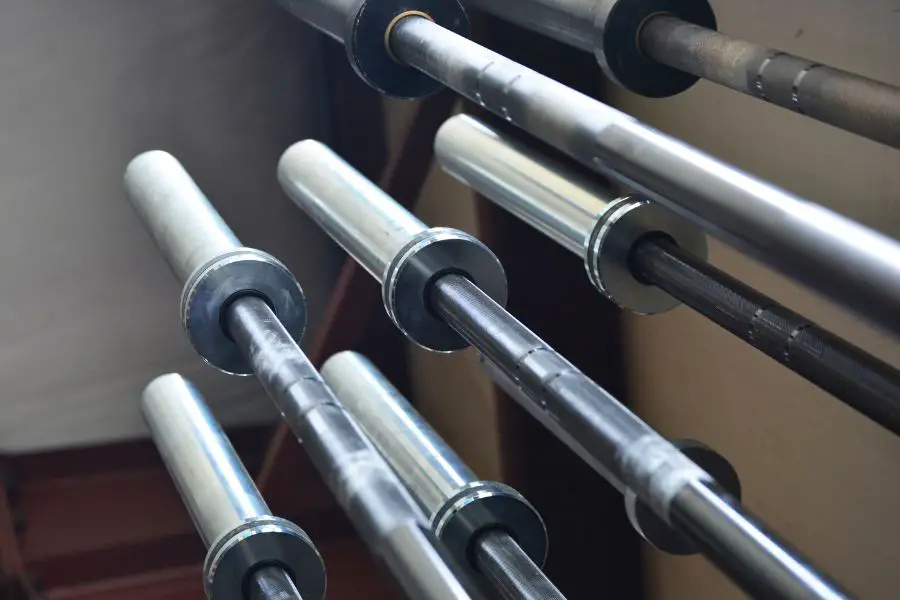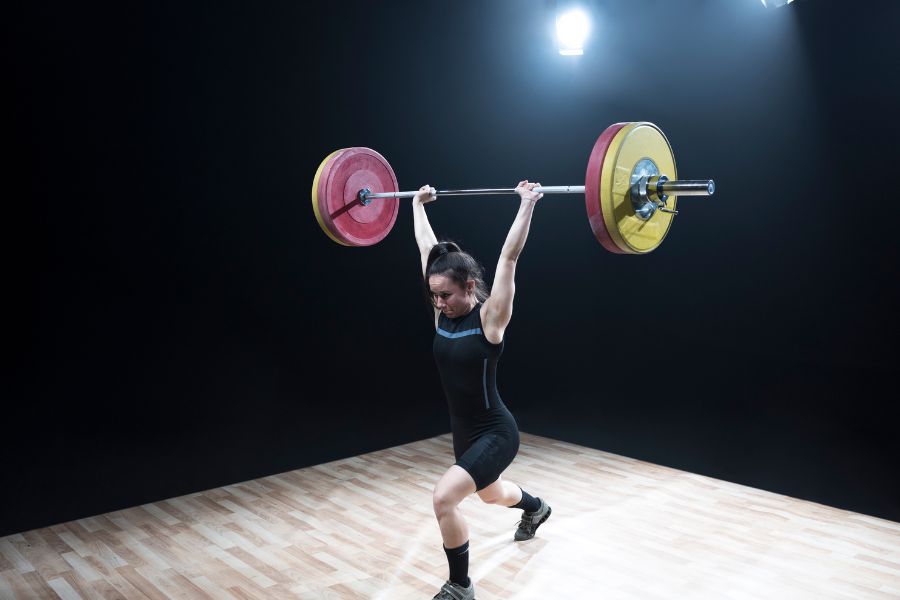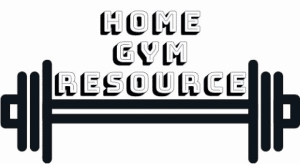Rust on a barbell isn’t something anybody wants to see. Luckily there are barbells out there that are more or less rust-proof. Which types are the best and which one works for you? We’ll walk you through it in the rest of this article.
The best corrosion-resistant barbells are made from stainless steel. They require minimal maintenance to stay in great condition and feel like a bare steel bar. They are an expensive choice, however. Chromed or Cerakote barbells are a great, more affordable option.
In the rest of this article, we’ll go into why you want a corrosion-resistant barbell, what the best options are, and which is the best for your situation.
Contents
Why You Want a Rust-Proof Barbell
Barbells are made from steel and steel rusts. A rusty barbell feels nasty in your hands, reduces grip, doesn’t look good and can impact the structural integrity of the bar.
Corrosion-resistant barbells;
While bare barbells can be made to last a very long time, it does take quite a bit of maintenance to do so. Rust-resistant barbells require a lot less maintenance to stay in good shape which leaves more time for weightlifting.
Especially in humid climates, this can make a huge difference. Where bare iron barbells can rust without even touching them, the right rust-proof bar will stay corrosion-free and shiny for a very long time.
Picking the right barbell doesn’t only involve looking at rust-proof options. Here are a few other factors to choose to get the right bar for you.
Which Types of Barbells are Rust Proof?
Some barbells are completely rust-proof, others are just bare metal that rusts easily. And all the coatings are somewhere in between.
The material of the bar and/or the coating has a big impact on how corrosion-resistant that specific barbell is so let’s take a look at the best options. I won’t go through all the types here, just the best.
You might also be interested in this article: 6 Popular Barbell Coatings and finishes compared.
Let’s take a closer look at those three types of barbells.
Stainless Steel
Most barbells are made from ‘normal’ steel and then either left bare or coated/finished with something. Stainless steel barbells are different since they’re made completely out of stainless steel.
Stainless steel barbells are the most corrosion-resistant and feel like a ‘real’ bare steel barbell.
And as you probably know, stainless steel doesn’t rust. Or it’s at least very corrosion-resistant.
The magic lies in the composition of the metal itself. Stainless steel is an alloy that contains chromium, which forms a passive layer on the surface of the steel. This layer acts as a shield against the elements, preventing the underlying metal from reacting with moisture, sweat, and contaminants.
As a result, stainless steel barbells remain rust-free and maintain their polished appearance. This makes them a top choice for anyone valuing rust resistance. Also, because stainless steel bars have no coatings, they feel pretty much like bare metal bars, which is the main reason why you would go for such a bar.
The downside of stainless is the price. They cost about $200 more than a comparable bare steel bar. However, if you factor in the longer lifespan, it’s easily worth it.
Chrome-Plated Barbells
Chrome-plated barbells feature a layer of chromium applied to the surface of the barbell. This layer not only provides a sleek and shiny finish but also serves as a protective barrier against corrosion.
Chromium’s inherent resistance to moisture and humidity helps prevent rust from forming on the barbell. The benefit of a chromed barbell besides its corrosion resistance is the price. Chromed bars are a lot cheaper than stainless steel ones.
The downsides are that the chrome can wear off over time and the feel isn’t as good as with a bare or stainless barbell.
My top recommended barbell for home gyms is chrome plated. You can find it here.
Cerakote-Coated Barbells: A Tough Defender
Cerakote is a ceramic-based coating that has gained recognition for its durability and resistance to wear and tear.
When applied to a barbell, Cerakote forms a protective layer that guards against corrosion.
This coating is not only effective in preventing rust but also provides a range of color options, allowing you to personalize your barbell while enjoying its rust-proof benefits. Cerakote-coated barbells are a smart choice for those who want both aesthetics and performance.
The downside of Cerakote is that it can scratch. Think about the sleeves. You constantly slide plates on and off which means the sleeves usually scratch pretty quickly. The shaft is usually fine unless you drop it on a sharp edge or clean it with abrasives.
Cerakote chipping is relatively rare but happens and there is just bare steel underneath which can then corrode.
Other Coatings and Considerations
Apart from stainless steel, chrome, and Cerakote, there are other coatings and materials used to create rust-proof barbells.
These coatings may include zinc or other specialized finishes that contribute to the barbell’s ability to resist corrosion.
While these coatings provide a degree of protection, they aren’t perfect. A big downside is that they can wear off over time and then you’re back to a bare barbell.
Are Stainless Barbells Worth The Money?

Stainless steel seems like it’s the best but most expensive, are they worth that extra money?
If you can afford a stainless barbell, go for it, you get unmatched corrosion resistance, feel, and durability. And if another material can match one of those, none can match all three.
Looking at it with a long time horizon, that $200 extra you pay over a chromed bar is very little since stainless barbells can last for decades. The difference with Cerakote is usually less.
Since barbells last so long, there’s a good chance there is a stretch of time in there when you don’t have the time or opportunity to put a lot of care into maintaining your gym equipment. A stainless bar doesn’t care about that and will happily come out of retirement after years.
Leaving a bare barbell alone for a few years likely results in a rusty bar that has to be replaced.
Choosing the Right Rust-Proof Barbell: Factors to Consider
Picking the right barbell isn’t straightforward. It depends on your needs and environment what is the best option. What do you value the most? Is rust protection the only thing you want from a barbell or are there other factors?
If rust protection is the only thing you care about, stainless steel is the best option. It will do everything you want but is the most expensive. If you’re on a budget or want another specific feature like a cool color, another option might be better.
Let’s take a look at the different factors to consider;
1. Type of Weightlifting
The type of weightlifting you engage in plays a significant role in your barbell selection. Different exercises and techniques exert varying amounts of stress on the barbell’s surface.
If you’re into Olympic lifting or powerlifting, where the bar is frequently dropped or subjected to heavy loads, a more robust rust-proof option like stainless steel might be your best bet.
For general fitness, a chromed barbell will do fine although the other types would still be a little better and more durable.

2. Intensity of Use
The frequency and intensity of your weightlifting sessions are crucial factors. If you’re a professional athlete, gym owner, or someone who trains consistently and intensely, investing in a higher-quality rust-proof barbell becomes more relevant.
Unless you’re an athlete who has to use a bare barbell during a competition, some level of rust protection is always a good idea. Even less durable coatings like zinc or black oxide are better than nothing.
A barbell in a garage gym that’s used 3x a week can get away with a barbell that doesn’t have the most durable coating since it will take much longer to wear off. In a commercial gym, on the other hand, that bar wouldn’t last that long.
How you store your barbells after use also matters. Learn more about that by clicking the link.
3. Maintenance
Consider the level of maintenance you’re willing to commit to. While rust-proof barbells are designed to resist corrosion, regular cleaning and upkeep are still essential to prolong their lifespan. however, they do require a lot less care than non-protected bars.
If you prefer low-maintenance equipment, stainless steel, chrome or Cerakote are your top choices. However, if you’re diligent about cleaning and don’t mind occasional touch-ups, other rust-resistant coatings can be suitable.
With a stainless steel bar, you don’t have to worry about any of that and thus you can reduce the amount of maintenance. Although you still want to keep your bars clean anyway.
Read here how you can properly clean a barbell
4. Climate
The environment in which you’ll be using your barbell matters. If your gym space is in a humid or coastal area where moisture levels are high, a corrosion-resistant bar becomes much more important.
In dry, hot climates, you can get away with much less well-protected bars. The more humid your gym is, the better the corrosion protection of the barbell should be.
You might also want to read this article: Why Barbells Rust
5. Budget Considerations
Of course, your budget is a very important factor in choosing a barbell.
While stainless steel offers unparalleled corrosion resistance, it comes at a premium cost. Look at your wallet and see what you can afford. If you can’t afford a stainless bar, look at cerakote. Still too expensive? Chromed it is.
Remember that the investment in a high-quality rust-proof barbell can pay off over time by reducing replacement costs and maintenance efforts.
